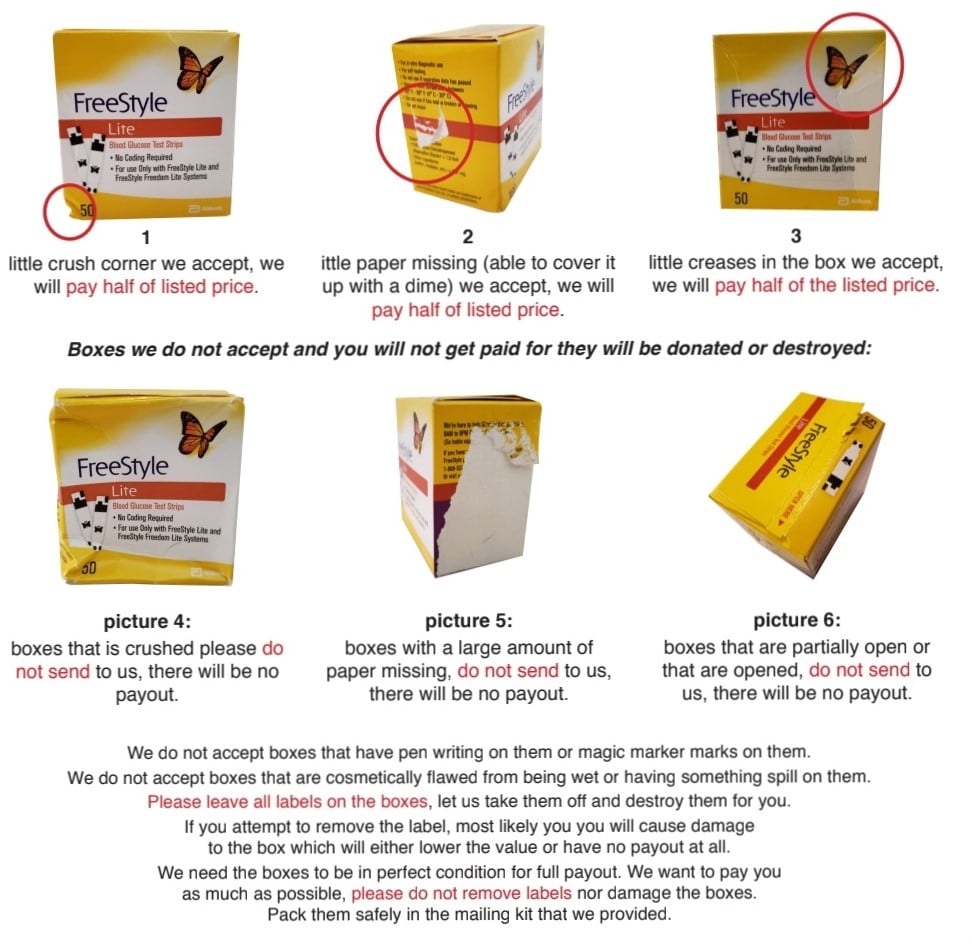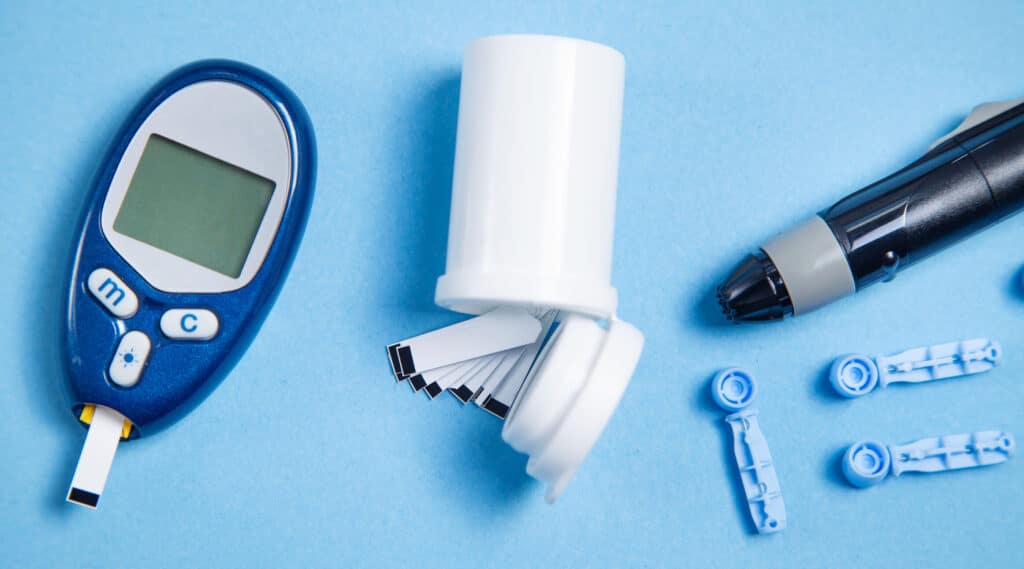
More Cash for Test Strips: What We Won’t Buy and Why
Posted on July 01, 2023 at 12AM
At More Cash for Test Strips, we strive to provide valuable information about buying and selling diabetic test strips, ensuring you have the knowledge you need. As a trusted company in the industry, we understand the importance of transparency and want to ensure that our customers have all the necessary details before initiating any transactions.
This blog aims to shed light on our specific criteria when purchasing diabetic test strips. While we are committed to offering fair prices for a wide range of test strip brands, there are certain test strips we cannot buy. This article will delve into the reasons behind our decision and the factors influencing our purchasing choices.
What Are Diabetic Test Strips?
Diabetic test strips are small, disposable strips used to measure blood glucose levels in individuals with diabetes. They are an essential component of glucose monitoring systems, commonly used by people with diabetes to manage their condition effectively.
The test strips work with a glucose meter or a blood glucose monitoring device. These meters measure glucose concentration in a tiny blood sample obtained from the fingertip, forearm, or other body parts. The diabetic test strip is the interface between the meter and the blood sample.
Why Are Test Strips Important?
Test strips are integral to managing diabetes, especially for individuals who rely on regular blood glucose monitoring. These small, disposable strips play a crucial role in determining blood glucose levels accurately and conveniently.
Here are several reasons why test strips are important for people with diabetes:
- Blood Glucose Monitoring: Test strips enable people with diabetes to monitor their blood glucose levels effectively. Regular testing provides valuable information about how the body responds to food, physical activity, medication, and other factors. This data empowers individuals to make informed decisions regarding their diabetes management.
- Treatment Adjustments: Individuals can assess their blood glucose levels and adjust their treatment plan appropriately using test strips. Whether it involves adjusting insulin doses, modifying meal plans, or incorporating exercise, test strips are crucial for optimizing diabetes management.
- Hypoglycemia and Hyperglycemia Detection: Test strips allow individuals to promptly identify hypoglycemia (low blood sugar) and hyperglycemia (high blood sugar) episodes. Detecting these fluctuations in blood glucose levels is essential for preventing complications and taking timely corrective measures, such as consuming glucose tablets or adjusting insulin dosages.
- Trend Analysis: Consistent monitoring using test strips provides a wealth of data that can be used to identify patterns and trends in blood glucose levels. By analyzing these trends, individuals can understand how certain factors, such as diet, exercise, stress, and medication, impact their blood sugar levels. This information enables proactive adjustments to diabetes management routines.
- Preventing Complications: Consistent blood glucose monitoring using test strips aids in preventing both short-term and long-term complications associated with diabetes. By keeping blood sugar levels within target ranges, individuals can minimize the risk of immediate problems like diabetic ketoacidosis (DKA) and long-term complications such as nerve damage, kidney disease, and cardiovascular issues.
Diabetic test strips are essential for diabetics, enabling them to monitor their blood glucose levels accurately and make informed decisions about their treatment and lifestyle choices.
Why Do People Sell Their Test Strips?
There are several reasons why people may choose to sell their test strips, which are commonly used for monitoring blood glucose levels in individuals with diabetes. And here are some number of reasons why.
- Excess or unused supplies: Some patients with diabetes may find themselves with surplus test strips due to changes in their testing regimen, prescribed equipment upgrades, or medication adjustments. Rather than allowing these unused supplies to waste, they may sell them to recoup some of the cost or help others in need.
- Financial considerations: Diabetes management can be expensive, especially for those without adequate insurance coverage or limited financial resources. Selling test strips can provide an opportunity for people to generate some additional income or offset the costs associated with their diabetes care in this case.
- Changing brands or equipment: People with diabetes often rely on specific brands or models of blood glucose meters and accompanying test strips that work best for their needs. However, if they switch to a different brand or receive a new meter model that uses incompatible test strips, they may choose to sell the surplus strips for their old device to avoid wastage.
- Supporting others in need: It is a fact that some individuals choose to sell their extra test strips as a way to help others who may not have easy access to affordable supplies on the market. By selling them at discounted prices or donating them to charitable organizations, they contribute to improving the accessibility of vital diabetes management tools for financially strained individuals who lack proper insurance coverage.
It’s important to note that while selling test strips can be a viable option for some individuals, there are regulations and guidelines in many regions to ensure these medical supplies’ safety, quality, and accuracy.
It is advisable to consult local laws and guidelines and consider reputable channels for buying or selling test strips to ensure compliance and protect the health and well-being of all parties involved.

Reasons Why We Won’t Buy Your Test Strips
Our business, More Cash for Test Strips, buys new, unopened, and unused test strips for people who sell them, and many of you wonder why we won’t buy your diabetes test strips supplies. To answer that question, here are several reasons why we won’t buy your supplies.
Label/Box Coating damage
We cannot purchase diabetic test strip supplies with damaged labels or box coatings. This damage can affect the readability of important information, such as expiration dates or brand names, which is crucial for ensuring the quality and safety of the products.
Label Removal damage
We are unable to buy supplies that exhibit damage caused by label removal. This type of damage may indicate that the product has been tampered with or used previously, compromising its integrity and reliability.
Label Removal/Tear damage
Diabetic test strip supplies with torn or partially removed labels are not eligible for purchase, even if you sell them for a small price. Such damage can make identifying the product, its specifications, or any essential warnings or instructions difficult, making it unsafe.
Label Damage (Not readable)
We do not buy supplies with label damage that renders the information unreadable. It is vital to have clear and legible labels to ensure proper product identification and adherence to usage guidelines, guaranteeing the accuracy of diabetic testing results.
Label Damage (Stain damage)
Supplies with label damage caused by stains are not accepted. Stains can obscure crucial information and raise concerns about sanitary conditions or potential product contamination, compromising reliability and safety.
Pen Mark damage
Diabetic test strip supplies that display pen marks are not eligible for purchase. Pen marks can obscure essential details on the label, leading to potential misinterpretation or incorrect usage, thus jeopardizing the accuracy of blood glucose readings and overall patients’ well-being.
Sell Diabetic Test Strips Today
Are you looking to sell your diabetic test strips? Look no further! At More Cash for Test Strips, we offer a quick and hassle-free way to turn your new, unopened, and unused boxes of diabetic test strips into money and cash. Sell your diabetic test strips now and experience the convenience of More Cash for Test Strips!
If you have any questions or want more information, call us at (310) 892-2808.

